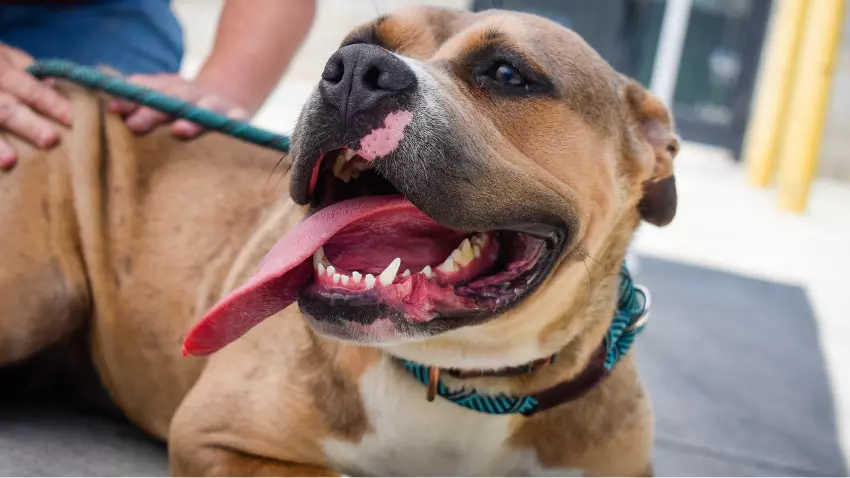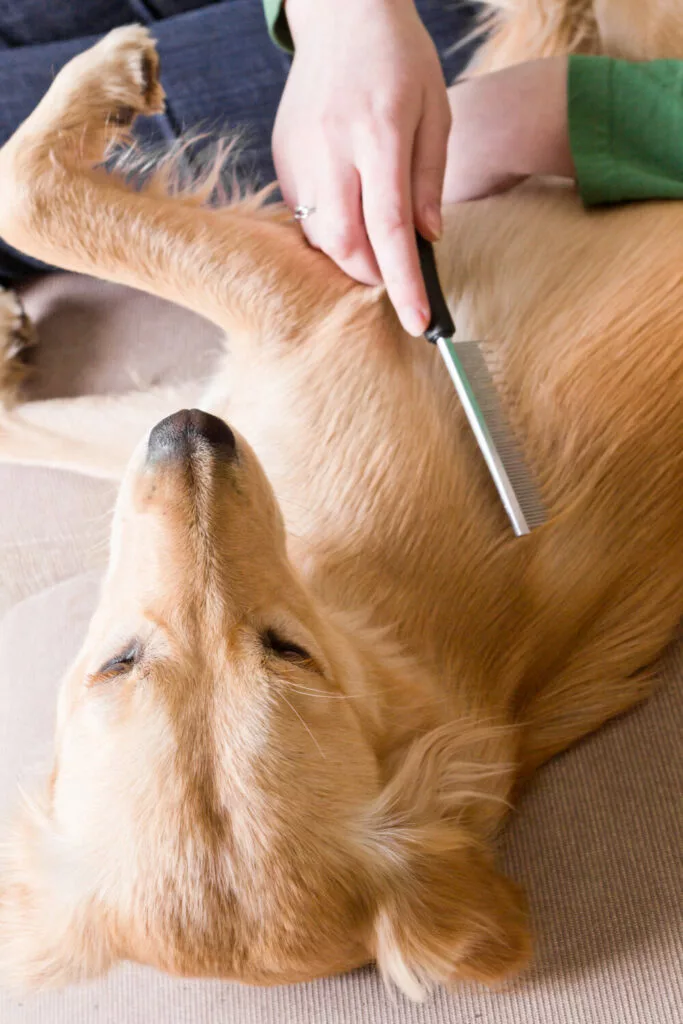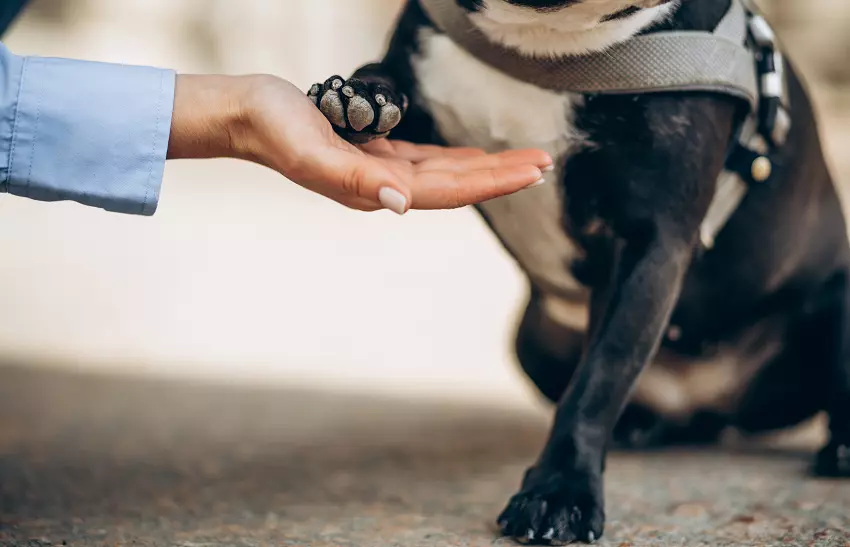How Long Does It Take A Rescue Dog To Adjust To A New Home?
Adopting a rescue dog comes with a set of challenges, one of which is helping the canine adjust to its new home. Some dogs will adapt right on, while others will take longer than usual.
Below, I discuss this topic together with tips on how to help your rescue dog ‘decompress’. Whether you’re still planning to adopt or already did, the points below will be a big help.

Why does a rescue dog need an adjustment period?

All dogs that are rehomed or brought to a new place need enough time to adjust. Canines are beings of habit, and if there’s a drastic change in their usual routines, it will cause them extreme stress.
In the case of rescue dogs, rehoming means being overwhelmed with new sights, sounds, and smells. Most rescue dogs will either cower in fear or show immediate aggression under these conditions.
Remember that these reactions from rescue dogs are mainly due to the sudden change. The fact that rescue dogs have an ugly past also makes it hard for them to adjust. Imagine yourself being abused, locked up in a kennel, and brought to a new place. It’s too much for a dog to process in just a short period.
This is why veterinarians and dog trainers recommend that you let your rescue dog ‘decompress’. It’s similar to when divers take decompression stops when rising to the surface. Giving your dog this period will let their mind and body adjust to the new home.
How long does a rescue dog honeymoon period take?
As mentioned, you really can’t tell how fast your rescue dog will adjust to your home. It all depends on the canine’s experiences, level of training, and extent of socialization.

- Three days. During this period, your rescue dog will show signs of anxiety. The pooch will be hiding in dark spaces. The dog will also avoid eye contact and any physical contact with its new owners. It’s said that if your rescue dog doesn’t show violent behavior within this period, you’re on the right track.
- Three weeks. At this point, most rescue dogs will start to calm down. Others would be entirely in tune with their new home and owner. It’s best to use this period for training and establishing your bond with your pet. This is a crucial period where you can make positive associations.
- Three months. Overall, the first three months of adopting a rescue dog are the most crucial adjustment period. Unfortunately, many adopters would surrender the dogs within three months because they failed to understand the canine’s needs.
Take note that the Magic of Threes is merely a theory. Each dog will have its own adjustment process. You just have to give the canine enough time, more so if it experienced violence from its previous owner.
How to help your rescue dog adjust to its new home
The canine’s first week at your home is all about being self-protective. This is normal for all dogs, rescued or not.
What you need to do is help the canine with the following decompression steps:

Follow your dog’s lead
Forcing your rescue dog to get out of its hiding place is a no-no. Doing so will sabotage the adjustment period. Worse, the rescue dog will start to associate you with a negative experience.
Instead, you should follow your dog’s lead. Let the canine come out of its hiding place on its own. You can try coaxing it with food or treats but never pull them out physically.
Do not set expectations.
You’ll never know what’s going to happen when you adopt a rescue dog. No matter how much you plan, the first 48 hours will be unpredictable. So, for now, the goal is to let the dog adjust to your home with no expectations.
When it comes to adopted dogs, less is always more. A small act of retrieving a treat in the open is already a big win. Go slow and let your dog establish its trust with you.
Keep a calm environment.
A rescue dog will adjust easily to a calm and predictable environment. Avoid loud sounds, sudden movements, or inviting guests during the adjustment period.
Ideally, you should keep a rescue dog in a quiet room with the door open. This way, the dog can come out whenever it wants to.
Be present
It’s important to be around in the first few weeks when you adopt a rescue dog. It’s a big mistake to bring home a rescue then lock them up alone when you go to work.
Your presence matters in the first 3 to 5 weeks. This is when the rescue dog’s real personality will start to surface. You’ll be missing out on the bonding if you’re not around all the time.
Take note that your rescue dog must see you as its protector. This is where you’ll get its trust and affection.
Start a routine
Rescue dogs will adapt to their new home faster if they can pick up a routine. For example, sticking to scheduled mealtimes will let the dog know that there’s food coming. The same goes for potty breaks, playtime, and interaction with other family members.
Most importantly, you should introduce every activity slowly. Feeding and potty breaks should come first. Once your rescue dog is more relaxed, you can start short walks, playtime with toys, and training.
Can a dog starve itself to death?
Another problem pet owners deal with is when a rescue dog won’t eat. While it can be daunting, experts say it’s a normal reaction due to stress and fear.
Some dogs may take a few days to start eating full meals in their new homes.
Generally, a missed meal isn’t a big deal. However, if your rescue dog refuses to consume any food for more than 48 hours, it’s best to call a veterinarian.
Dogs can starve themselves to death in as fast as five days. If accompanied by the refusal to drink water, the physical decline would be much faster.
Meanwhile, other pet owners experience the opposite. A few friends I talked to mentioned that their rescue dog will eat cat poop instead. So why does dog eat cat poop? Like the refusal to consume food, coprophagia can be triggered by stress, fear, and medical conditions.
It’s also possible that the rescue dog has been deprived of food in its previous home. With that, eating poop and other inedible items became its habit. This requires immediate intervention to avoid potential health consequences.
Conclusion
How long does it take a rescue dog to adjust to a new home? Only your pet knows the answer to this. The least you can do is give the canine a safe space and enough time to acclimate. In a matter of weeks, you will notice positive changes. You just have to take it slow with a lot of patience.
